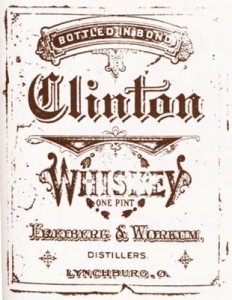 The war years heighten a growing concern among many Baptists: alcohol. While most Baptist churches yet use wine (often homegrown) in communion, and few Baptists advocate total abstinence, more Baptist leaders voice disapproval of the widespread use of hard liquor, while local Baptist congregations wage a war upon drunkenness, expelling many male members for overconsumption.
The war years heighten a growing concern among many Baptists: alcohol. While most Baptist churches yet use wine (often homegrown) in communion, and few Baptists advocate total abstinence, more Baptist leaders voice disapproval of the widespread use of hard liquor, while local Baptist congregations wage a war upon drunkenness, expelling many male members for overconsumption.
It is, in short, an uneasy time for Baptists in regards to alcohol. The temperance movement has already made inroads in congregations, while in the decades after the war, voices calling for abstinence will rapidly swell. For now, Baptist attention is trained upon the problem of alcohol in army camp life. Many soldiers wake up this morning after Christmas with a hangover, despite efforts by officers North and South to address the flow of spirits in the camps.
Baptists of the South, framing salvation in terms of personal piety and behavior, are especially critical of the prevalence of intoxicating beverages in Confederate ranks. Many Southern Baptist leaders on the home front wage an incessant — and largely unsuccessful by their own reckoning — battle during the war years to keep God’s southern army sober.
But this month the Baptist press of the South celebrates Confederate General Braxton Bragg’s efforts to curb the consumption of alcohol among his soldiers. From an order issued by Bragg:
The evils resulting from the sale of intoxicating liquors in Pensacola has become intolerable. More than half the labors of Courts Martial result from it — demoralization, disease and death often prove it. Our only military executions have been caused by it. We have lost more valuable lives at the hand of Whiskey Sellers than by the balls of our enemies. The Commanding General has promised himself to return the men of his army to the mothers, wives, and sisters who have cheerfully sent them forth to repel the invader, in as good a moral condition as he received them; to do this, he must dry up the fountain which supplies this stream of pollution, that all his efforts have failed to control.
The domestic enemies, who have done us more harm by this traffic, than the foreign invaders, shall no longer fill their pockets by dealing out poison to the gallant men keeping watch in front, whilst they sleep quietly in their bed.
The sale, or introduction of any kind of intoxicating liquor within five miles of the lines of this Army is prohibited, unless under special sanction of the Commanding General for medical purposes.
Pronouncements against alcohol become a common occurrence during the war, both North and South. Orders and edicts, however, prove largely ineffective in separating soldiers from the “poison” of which General Bragg speaks.
Source: “Gen. Bragg’s Opinion concerning Whiskey for the Soldiers,” Biblical Recorder, December 25, 1861 (link); Civil War-era whiskey label (link)


